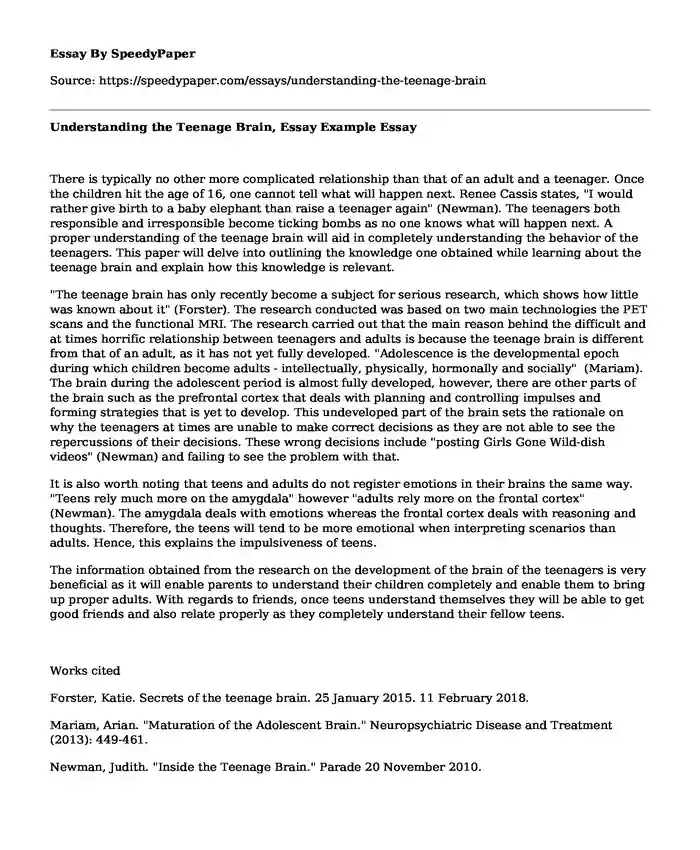There is typically no other more complicated relationship than that of an adult and a teenager. Once the children hit the age of 16, one cannot tell what will happen next. Renee Cassis states, "I would rather give birth to a baby elephant than raise a teenager again" (Newman). The teenagers both responsible and irresponsible become ticking bombs as no one knows what will happen next. A proper understanding of the teenage brain will aid in completely understanding the behavior of the teenagers. This paper will delve into outlining the knowledge one obtained while learning about the teenage brain and explain how this knowledge is relevant.
"The teenage brain has only recently become a subject for serious research, which shows how little was known about it" (Forster). The research conducted was based on two main technologies the PET scans and the functional MRI. The research carried out that the main reason behind the difficult and at times horrific relationship between teenagers and adults is because the teenage brain is different from that of an adult, as it has not yet fully developed. "Adolescence is the developmental epoch during which children become adults - intellectually, physically, hormonally and socially" (Mariam). The brain during the adolescent period is almost fully developed, however, there are other parts of the brain such as the prefrontal cortex that deals with planning and controlling impulses and forming strategies that is yet to develop. This undeveloped part of the brain sets the rationale on why the teenagers at times are unable to make correct decisions as they are not able to see the repercussions of their decisions. These wrong decisions include "posting Girls Gone Wild-dish videos" (Newman) and failing to see the problem with that.
It is also worth noting that teens and adults do not register emotions in their brains the same way. "Teens rely much more on the amygdala" however "adults rely more on the frontal cortex" (Newman). The amygdala deals with emotions whereas the frontal cortex deals with reasoning and thoughts. Therefore, the teens will tend to be more emotional when interpreting scenarios than adults. Hence, this explains the impulsiveness of teens.
The information obtained from the research on the development of the brain of the teenagers is very beneficial as it will enable parents to understand their children completely and enable them to bring up proper adults. With regards to friends, once teens understand themselves they will be able to get good friends and also relate properly as they completely understand their fellow teens.
Works cited
Forster, Katie. Secrets of the teenage brain. 25 January 2015. 11 February 2018.
Mariam, Arian. "Maturation of the Adolescent Brain." Neuropsychiatric Disease and Treatment (2013): 449-461.
Newman, Judith. "Inside the Teenage Brain." Parade 20 November 2010.
Cite this page
Understanding the Teenage Brain, Essay Example. (2022, Feb 25). Retrieved from https://speedypaper.net/essays/understanding-the-teenage-brain
Request Removal
If you are the original author of this essay and no longer wish to have it published on the SpeedyPaper website, please click below to request its removal:
- Free Essay about Anita Stewart, A Silent Film Star
- Mistaken Judgment - Personal Experience Essay Example
- Something New about Bitcoin Data Analysis, Essay Sample for You
- Literary Essay Sample: Desdemona's Symbolic Presence in Othello
- Free Paper: Cognitive Behavior Therapy in the Treatment of LPSS and Depression
- Free Essay Focusing on Kotter's 8 Steps and Blue Ocean Strategies
- Essay Sample on Forensic Procedures to Collect Forensic Evidence from Digital Devices
Popular categories





